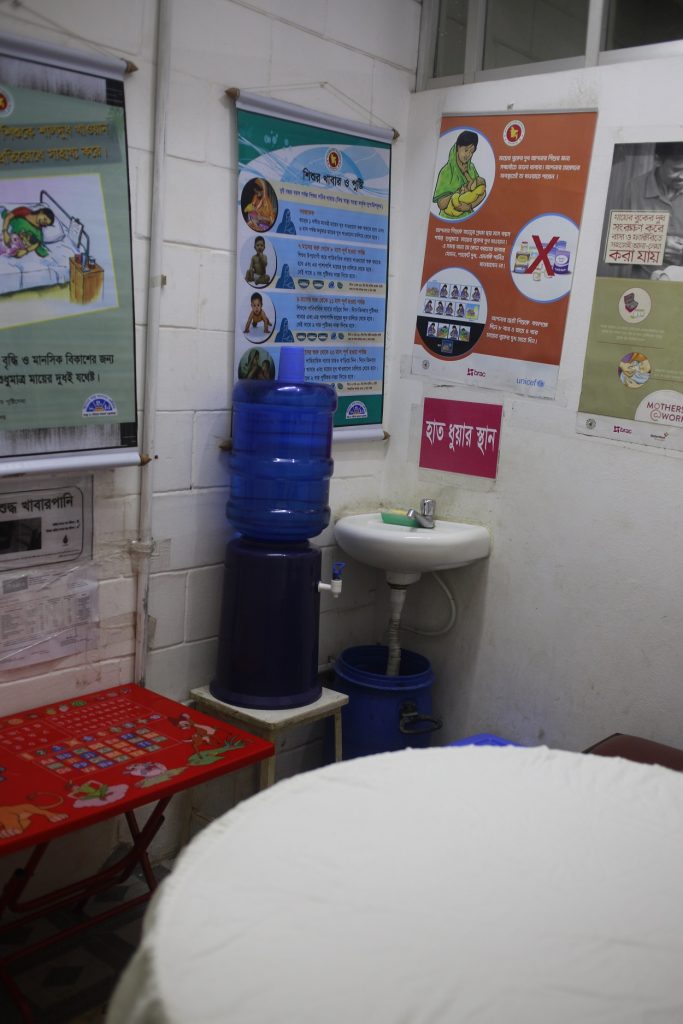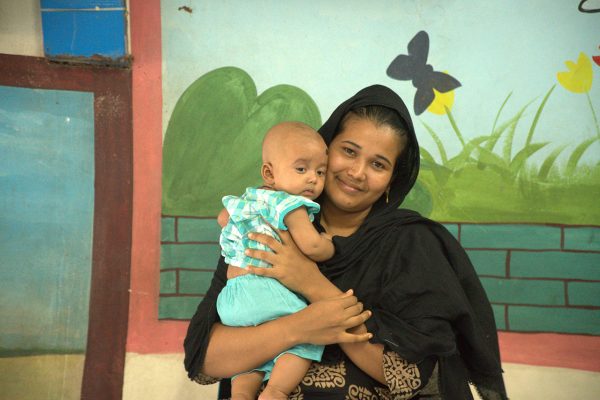Garment factories embrace breastfeeding
Reading Time: 3 minutes
Globally, only 38% of mothers breastfeed exclusively, giving their babies nothing but breastmilk for the first six months. The figure is higher in Bangladesh, at 55%. But it is still not high enough. Exclusive breastfeeding is crucial for a baby’s healthy development. Aside from cultural traditions, and lack of knowledge, the need to work is also an influencing factor.
In Dhaka, a small transformation is shaking up ready-made garment factories, an industry known for its exploitation of women. Seeking to change their reputation, and become more compliant with labour laws, two factories, DBL and Vision Apparels signed up to the Mothers@Work pilot in October 2016- a UNICEF led initiative that creates breastfeeding corners at work. With BRAC as a partner, the project supports the maternity rights of women, and promotes breastfeeding, ensuring babies receive the nutrition they deserve.
At Vision Apparel’s factory in Mirpur, central Dhaka, 13 mothers are currently lactating.
Twice a day, at 10am and 3pm, relatives of the working mothers arrive at the factory, bringing them their babies to be breastfed. Downstairs, a small daycare centre is boisterous with the activity of six children. Although it accommodates children under two, the mothers say they prefer having their babies at home, instead of being confined to one room.
In precise routine, the 13 women file down, slip into the small breastfeeding corner adjacent to the nursery, and begin feeding. In the utilitarian environment, the feeding breaks are tinged with softness.
Ayesha Begum, a 25-year-old mother of two, started working at the factory four years ago. Her first child, now six, was breastfed until the age of two, since Ayesha was a homemaker then. She wanted the same for her second child, who is 11-months-old.
She is thankful she can do so. “None of my previous jobs had breastfeeding corners. This is the only place I know that has this. It’s very helpful.”
Shumi’s first child is also six. Her second is just three months old. Excitedly, she says, “I had all the information I needed when I was pregnant with my second baby. The BRAC Apa here at work told me. When my baby was born, I was so happy to feed him my colostrum in the first hour. My younger sister brings my baby to me, and if I have extra milk, I express it.”

A corner for working mothers to breastfeed their babies.
Support
As natural an instinct as it is, breastfeeding is not always easy. BRAC’s programme organisers provide counselling to the mothers. They have also trained the factory’s social welfare worker to provide support. She sits with the mothers during feeding breaks, advising on feeding positions, answering questions about breast milk production. She also teaches women how to deal with sore, cracked nipples, and how to express milk. She motivates them to breastfeed exclusively for six months, and advise them how to introduce complementary feeding after six months. It is a complete holistic approach, and it works.
The initiative has been beneficial for mothers, babies and the factories.
The exclusive breastfeeding rate has risen rapidly from 17% to 72% at the two factories since the initiative launched in October 2016.
“When a garment factory worker returns to work after four months maternity leave, she may stop breastfeeding,” shares Dr Mithun Gupta, a senior sector specialist working in BRAC’s nutrition programme, “We see that the mothers are happy they can breastfeed at work, and to have support.”
Management is happy too. Dr AKM Hamid, director of Vision Apparel, says the breastfeeding corners have helped the factory retain staff, in an industry with a high staff turnover rate.
“Before, the number of pregnant women who used to drop out of work was 85%,” he shares, “It’s now 45%. We believe that breastfeeding is not an obstacle to productivity. Addressing this important issue for working mothers in Vision Group with the help of BRAC and UNICEF gives us an opportunity to raise awareness and retain skilled working mothers for the industry.”
Aside from breastfeeding corners and breaks, Mothers@Work focuses on five other issues that need to be addressed: paid maternity leave, flexible working arrangements, medical benefits, provision of daycare and non-discrimination.
With the pilot phase deemed successful, Mothers@Work was scaled up in July 2018, and is now active in 25 factories.
Bibi-Aisha Wadvalla is a communications manager of BRAC’s health, nutrition and population programme.





